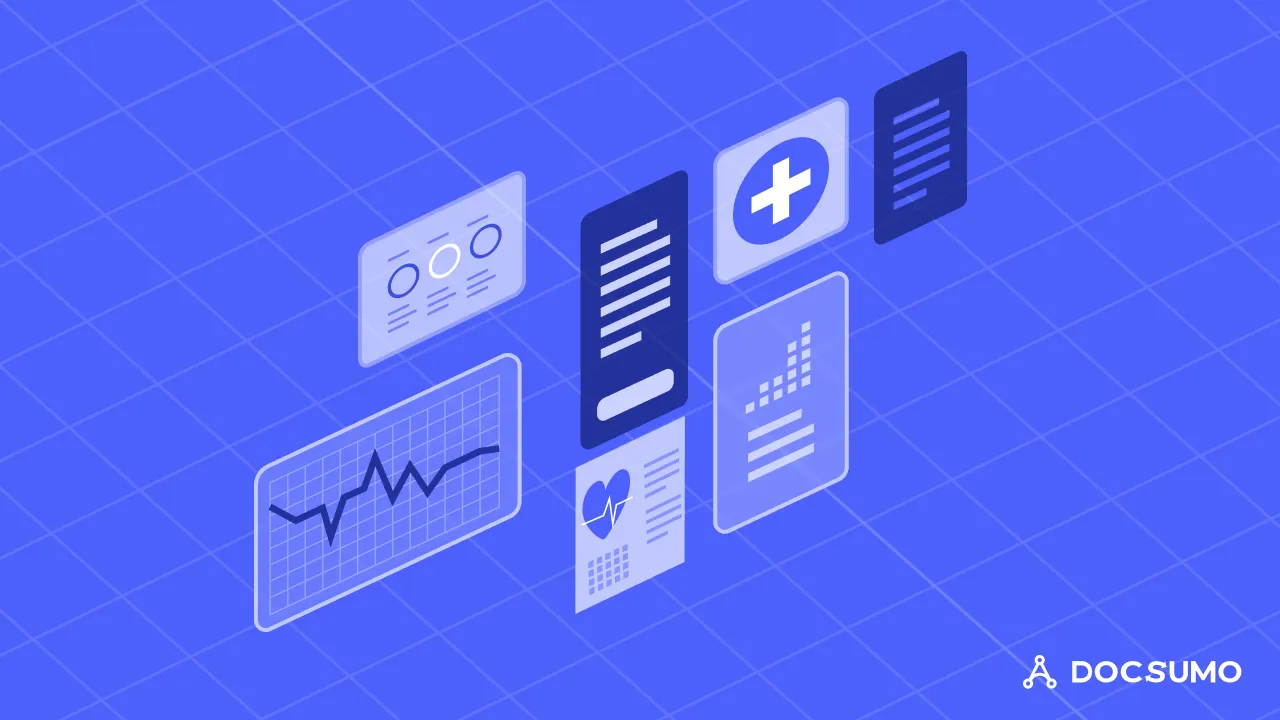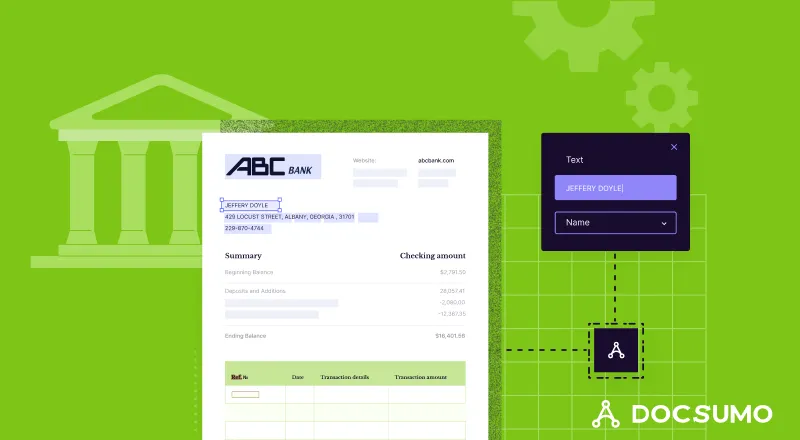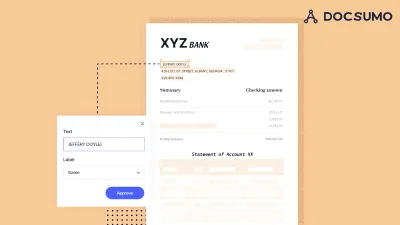How Does Intelligent Document Processing in Healthcare Industry Boost Efficiency?
The healthcare industry is drowning in paperwork. Learn how Intelligent Document Processing (IDP) can be your lifeline! This blog explores how IDP automates tasks, improves accuracy, and empowers healthcare providers to focus on patients. Discover the benefits and exciting use cases of IDP in healthcare.

According to Global Data, the global healthcare sector is set to grow by 11.25% annually by 2027, leading to a steady increase in paperwork and documentation. However, the rote tasks of note-taking consume time and drain professionals, leading to discrepancies in human connection in healthcare.
Eric Topol, an American cardiologist and scientist, highlights this in his book Deep Medicine. He also believes AI will play a significant role in solving the issue. In his own words:
“The greatest opportunity offered by AI is not reducing errors or workloads, or even curing cancer: it is the opportunity to restore the precious and time-honored connection and trust.”
AI-driven practices like intelligent document processing in healthcare can relieve professionals. Allowing them time to heal and connect with every patient.
What is Intelligent Document Processing?
Intelligent Document Processing (IDP) can extract, classify, and organize data from various documents. As the name suggests, it is an intelligent way of processing documents and capturing insights. It leverages AI and ML to automate handling, regardless of the format.
IDP reads and converts images to text and understands the context. It automates tasks and frees up employees from tedious data work. Here’s a complete breakdown of its core functions:
- Data Extraction: AI and ML technology allows pinpointing and pulling essential data. For instance, it can extract relevant information like names, dates, or invoice amounts. It can also automatically extract customer details from piles of claims.
- Document Classification: After extracting key points, IDP categorizes them. Each piece of data, such as invoices, receipts, or contracts, has a category based on its type. This routes documents to appropriate teams and streamlines workflow.
- Data Validation and Enrichment: IDP can also check the accuracy of data and enrich it. It refers to external sources for this process. For instance, it can verify the address on an invoice against a standard database.
Automating tasks extricates professionals from their tedious routines. It transforms data-driven processes by leveraging the power of AI.
The shift toward Intelligent Document Processing in healthcare
Intelligent document processing in healthcare saw a 190-200% YoY growth in 2020. This shows that the shift towards automation is already in motion. But why?
The healthcare industry has always relied on data-based systems. Every step of the journey is documented for reference through paperwork or digitally.
Traditionally, manual documentation took place. Loads of labor were employed for data entry from patient forms, claims, etc. While this system was adequately functional, it led to many challenges:
- Inefficiency: Staff gets bogged down in data entry. This diverts their attention from crucial tasks like patient care.
- Error-prone: An average human has a 0.67% chance of error in medical data entry. They are susceptible to misspelling names, dates, or numbers. These errors jeopardize a patient’s safety and cause unnecessary delays.
- Slow Processing Time: Finally, humans get tired. They’re not invincible. This means manual data processing can create backlogs and delays. Ultimately hindering timely access to patient information.
According to Root Data, the global big data in healthcare will grow by 19.06% annually by 2035. The industry will face a perfect storm of:
- Data Avalanche: Electronic health reports, genomic data, and imaging results will lead to a data deluge. Manual processing cannot keep up with it.
- Regulatory Burden: Patient privacy and data security are essential these days. Healthcare organizations are required to comply with stricter regulations. Humans may find it difficult to follow these rules, which increases the risk of non-compliance penalties.
Sticking to manual practices will only lead to more errors and delays. At this point, automation comes to the rescue. The usage of IDP can help fight these issues and lead to:
- Reduced reliance on manual data entry: It automates extraction from documents. Thus freeing up staff.
- Improved accuracy and consistency: AI can minimize errors and stay accurate irrespective of formats.
- Faster processing: IDP automates classification, routing, and extraction. Thus significantly reducing processing time.
Overall, a healthcare organization can eliminate inefficiencies by embracing automation. IDP can usher in a new era of streamlined workflow with better accuracy and processing time.
Why healthcare is a fit for Intelligent Document Processing
Paperwork in healthcare has been slowly rising every annum. Documentation varies from patient records to insurance claims. The sheer volume and diversity of these documents are overwhelming.
For instance, Imagine a hospital dealing with:
- Patient documents
- Insurance claims
- Medical bills
- Lab reports
- Prescriptions
Each document has a complex and variable format, making it difficult for humans to process. Many also believe professionals value paperwork over patient care.
In 2013, a poll by the National Library of Medicine revealed that 92% of residents undergo excessive documentation. Meanwhile, 73% experience compromised care because of the same.
Data also shows that paperwork has reduced the patient-doctor infraction time. In 2010, only 23% of time was spent interacting with patients. This calls for an automated solution like intelligent document processing in healthcare.
Benefits of Intelligent Document Processing in the healthcare industry
Intelligent Document Processing leverages OCR and ML technologies to automate, extract, and standardize data. In turn, this improves efficiency, accuracy, and cost savings. It has the potential to go beyond just streamlining work and can revolutionize healthcare.
Here’s a deep dive into the benefits of intelligent document processing:
1. Enhanced efficiency
IDP can automate tedious tasks like data entry, sorting and filling. This allows professionals more time to focus on what matters. Thus, they can integrate with the patients and provide high-quality care.
For instance, if a nurse didn’t consistently complete patient records, she would interact with patients. This builds trust and delivers personalized care plans.
2. Improved accuracy
Humans are not as accurate as machines. Thus, manual data entry is more prone to errors. This can lead to costly mistakes in billing, claim processing, and patient records.
IDP, on the other hand, uses OCR and machine learning to process data. It ensures accurate extraction, minimal human errors, and improved data integrity. This translates to fewer claim denials, improved patient safety because of complete records, and better outcomes.
3. Faster reimbursements
According to GoDigit, on average, a claim reimbursement can take 2-4 weeks to process. IDP integration can significantly reduce this. It will automate the claim processing workflow, allowing fast and accurate submissions.
This leads to quick reimbursement to healthcare providers, which improves cash flow and financial stability. The administrative burden was also reduced. They spend less time chasing payments and more time dedicated to patient care.
4. Better patient experience
IDP frees up various administrative departments from tasks and streamlines processes. This leads to a quicker turnaround time. In turn, this reduces waiting periods for appointments, test results, and billing inquiries. It increases the number of satisfied customers. These customers are more likely to return for future care and recommend others.
5. Data-driven insights
IDP uses various technologies like Optical Character Recognition (OCR), NLP, and machine learning to extract data. It unlocks the power of data trapped in documents. Empowering healthcare institutes to analyze trends and identify areas of improvement.
For instance, the data extracted helps optimize resource allocation and patient outcomes.
6. Regulatory compliance
The healthcare industry is heavily regulated. Every document must follow a set of rules and regulations. Humans being inaccurate are more likely to risk compliance.
However, IDP ensures compliance with HIPAA and other rules. It also facilitates accuracy and consistent data management. Overall, automated document classification and extraction can provide data privacy.
Intelligent Document Processing (IDP) healthcare use cases
With the rise in the healthcare industry's need, document processing is also increasing. Intelligent document processing in healthcare can help manage this with efficiency. Here are some use cases of IDP in various documentation:
1. Medical record processing
IDP can classify and extract essential data points from various records like:
- Patient Charts: Highlights key details like medical history, allergies, diagnosis and medications for informed care.
- Admission Forms: Data is automatically captured from forms to reduce manual entry errors and expedite patient admissions.
- Discharge Summaries: Post-discharge care is crucial for patient recovery. IDP extracts vital summaries from discharge slips to ensure a smooth transition.
2. Insurance claim processing
The complexities of insurance claims are a headache for healthcare professionals. In this case, IDP steps in to extract data from medical bills and process documents. It captures service charges, medication, and applied adjustments from bills.
Detailed insurance documents also undergo extraction and explanation of benefits. This streamlines claim processing and reduces the denial rate.
3. Patient onboarding
Healthcare institutes always have patients. Hospital emergency rooms alone see 145.6 million people every year. During this hustle, the onboarding of new patients can be tedious. IDP simplifies it by:
- Auto-populating forms: It extracts data from ID and insurance cards to populate registration forms. This saves time and reduces errors.
- Verifying information: To ensure accuracy, extracted data can also be verified with databases.
4. Appointment scheduling
Appointment scheduling is another task professionals perform every day. Many institutes have a separate staff allotted for scheduling appointments. IDP can assist them by:
- Extracting appointment details: It automatically captures details from emails or faxes. This reduces manual data entry and schedule overlapping.
- Facilitating Reminders: Appointment reminders are generated based on the extracted data. This improves patient adherence and reduces missed appointments.
5. Pharmacy refill processing
Medication management is a crucial but often unseen element of healthcare institutes. According to the WHO, medication errors can cost $42 billion globally. Thus, the integration of IDP is a must; it can help:
- Automated data extraction: It extracts medication details, patient information, and dosage instructions from prescriptions. This facilitates automatic refills and saves time.
- Inventory management: It tracks medication inventory based on refill requests, optimizing stock levels and preventing shortages.
Estimated cost reduction with Intelligent Document Processing
Data is the core of healthcare practices today. Without data, it is impossible to perform any activity. However, data management is a time-consuming task that requires tons of workforce. With the integration of AI technologies like IDP, it can be reduced. Studies show that IDP can:
- Reduce manual document processing costs by 35%
- Reduce time spent on documentation tasks by 17%
- Cut down document processing time by 50-70%
- Decrease operating costs by 30% YOY
The cost saving goes beyond labour reduction. It also increases claim approvals and patient satisfaction.
Healthcare document automation with Docsumo
Docsumo identified the unique challenges of documentation in the healthcare industry. In turn, we’ve designed a platform, especially for you. It offers features to maximize benefits, including:
- HIPAA compliance
- Pre-trained healthcare models
- Industry-specific use cases
- Scalability and customization
By leveraging Docsumo’s IDP solution, you can dedicate resources to deliver exceptional patient care.
Conclusion: The future of Intelligent Document Processing in healthcare
Intelligent document processing in healthcare is a technological upgrade and a transformative force. It automates data tasks and unlocks a future where:
- Healthcare professionals focus on what matters - patient care
- Streamlined workflows improve efficiency
- Data-driven decisions become a powerful tool.
In the coming years, IDP technology will have endless possibilities. There are chances of AI-powered medical coding and chatbots for patient communication. Furthermore, these systems will continue to learn and improve over time. As IDP continues to evolve, integrating it into healthcare will improve intelligence and patient focus.
Frequently Asked Questions
What is intelligent document processing healthcare?
Intelligent document processing in healthcare automates data extraction from medical records and insurance claims.
How intelligent document processing helps improve the healthcare industry?
Intelligent document processing can improve the healthcare industry by automating tasks and improving accuracy. This will accelerate overall efficiency and cost savings.
What are some standard intelligent document processing in healthcare examples?
Some examples of intelligent document processing in healthcare include: Extracting critical data from medical records, insurance claim processing, Streamlining new patient registration by auto-populating forms.

.png)


.webp)


.webp)
.webp)
.webp)
.webp)